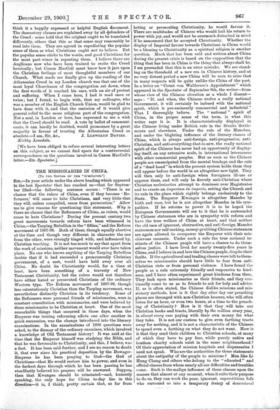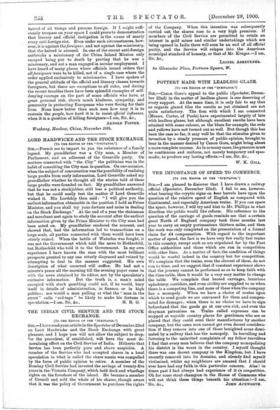• THE MISSIONARIES IN CHINA.
(To THE EDITOR OP TIER "SPECTATOR."]
Sin,—In your article under the above heading which appeared in the last Spectator that has reached us—that for Septem- ber 22nd—the following sentence occurs : "There is no chance that the rulers of China, even if they become 'Re- formers,' will cease to hate Christians, and very little that they will, unless compelled, cease from persecution." Allow me to give reasons for questioning this statement. Why is there no chance that the Reformers of China, as rulers, would cease to hate Christians? During the present century two great movements towards reform have been witnessed in China,—the Taeping Rebellion in the" fifties," and the Reform movement of 1897-98. Both of these, though equally abortive at the time and though very different in character the one from the other, were strongly tinged with, and influenced by, Christian teaching. It is not too much to say that apart from the work of missions, neither movement would ever have taken place. No one who knows anything of the Taeping Rebellion doubts that if it had succeeded a pronouncedly Christian government, of a sort, would have held sway over all China. No doubt its Christianity would, for a time at least, have been something of a travesty of New Testament Christianity, but the rulers would not therefore have either bated or persecuted Christians of the ordinary Western type. The Reform movement of 1897-98, though less ostentatiously Christian than the Taeping movement, was nevertheless distinctly Christian in its tendency. Some of the Reformers were personal friends of missionaries, were in constant consultation with missionaries, and were believed by these missionaries to be Christian at heart. One of the most remarkable things that occurred in those days, when the Emperor was issuing reforming edicts one after another in quick succession, was the change introduced into the literary examinations. In the examinations of 1898 questions were asked, to the dismay of the ordinary examinee, which involved a knowledge of Old Testament history! It was said at the time that the Emperor himself was studying the Bible, and that he was favourable to Christianity, and this, I believe, was a fact. It has been said further, and I see no reason to doubt it, that ever since his practical deposition by the Dowager- Empress he has been praying to God—the God of Christians—that He would restore him to power, and even in the darkest days through which he has been passing he has steadfastly believed his prayers will be answered. Suppose then that Kwangsu should be reinstated—and, humanly speaking, the only hope for China to-day lies in this direction—it is, I think, pretty- certain that, so far from
hating or persecuting Christianity, he would favour it. There are multitudes of Chinese who would hail his return to power with joy, and would not be overmuch disturbed in mind if he announced that he accepted Christianity. Whether the display of Imperial favour towards Christians in China would be a blessing to Christianity as a spiritual religion is another question. Much that has been said and written about China during the present crisis is based on the supposition that the thing that has been in China is the thing that always shall be. I am persuaded that this is an utter mistake. We are stand- ing on the threshold of a new era in Chinese history, and at no very distant period a new China will be seen to arise that in many respects will be quite unlike the China of the past. In a letter on "Count von Waldersee's Appointment" which appeared in the Spectator of September 8th, the writer--from whose view of the Chinese situation as a whole I dissent— says : "If, and when, the Chinese evolve a really national Government, it will certainly be imbued with the national spirit, which is pre-eminently commercial and industrial." That I thoroughly believe. The " national " spirit of China, in the proper sense of the term, is what this writer says it is. It is characteristically displayed in the Chinese living 'under British rule in the Straits Settle- ments and elsewhere. Under the rule of the Manchus, and under the blighting influence of the literary classes of China, which is always anti-foreign, anti-progressive, anti- Christian, and anti-everything-that-is-new, the really national spirit of the Chinese has never had an opportunity of display- ing itself, on any extensive scale, in international intercourse with other commercial peoples. But as soon as the Chinese people are emancipated from the mental bondage and the rule of a "dead hand" in which the present system holds them they will appear before the world in an altogether new light. They will then only be anti-foreign when foreigners ill-use or oppress them, and will only be fiercely anti-Christian where Christian ecclesiastics attempt to domineer over Magistrates and to create an imperiura in imperio, setting the Church and its rule in the place which rightly belongs exclusively to the State. The Emperor Kwangsu is altogether Manchu by birth and race, but he is not altogether Manchu in his sym- pathies. If he returns to power it is to be hoped the European Governments will see to it that he is surrounded by Chinese statesmen who are in sympathy with reform and have the true welfare of China at heart, and that neither the old race of ignorant, obstructive, and anti-foreign Manchu statesmen nor self-seeking, money-grubbing Chinese statesmen are again allowed to overpower the Emperor with their mis- chievous counsels. Under such a rule the true national in- stincts of the Chinese people will have a chance to do them- selves justice. I have lived for nearly twenty-five years in China, and I believe in and love the Chinese people, despite their faults. If the agricultural and trading classes were left to them- selves we missionaries should have little to fear from anti- Christian riots or from personal violence. I have found the people as a rule extremely friendly and responsive to kind- ness, and I have often experienced great kindness from them. They look upon missionaries as their friends, and they con- tinually come to us as to friends to ask for help and advice. If, as is often stated, the Chinese dislike missions and mis- sionary methods, how is it that day after day our preaching places are thronged with non-Christian hearers, who will often listen for an hour, or even two hours, at a time to the preach- ing of Christianity ? How is it that they will take our Christian books and tracts, literally by the million every year, in almost every case paying with their own money for what they take. It is not our custom to give even farthing tracts away for nothing, and it is not a characteristic of the Chinese to spend even a farthing on what they do not want. How is it that they send their children to Christian schools, at many of which they have to pay fees, while purely native and heathen charity schools exist in the same neighbourhood ? Of their appreciation of mission hospitals and dispensaries I need not speak. Who are the authorities for these statements about the antipathy of the people to missions? Men like Li Hung Chang and others who.belong to the " educated " and official classes from whom nearly all our difficulties and troubles come. Such is the malign influence of these classes upon the masses that almost at any moment, when it suits their purpose to do so, they can work the poor, ignorant, superstitions folk who surround us into a temporary frenzy of demoniacal
hatred of all things and persons foreign. If I might suffi- ciently trespass on your space I could prove to demonstration that literary and official instigation is the cause of nearly every anti-foreign riot. Even under each circumstances, how- ever, it is against the foreigner, and not against the missionary, that the hatred is aroused. In one of the recent anti-foreign outbreaks a missionary of the China Inland Mission only escaped being put to death by proving that he was a missionary, and not a man engaged in secular employment. I have heard of many places where officials issued orders that all foreigners were to be killed, not of a single case where the order applied exclusively to missionaries. I have spoken of the general attitude of the official and literary classes towards foreigners, but there are exceptions to all rules, and during the recent troubles there have been splendid examples of self- denying courage on the part of some officials who have, at great personal risk, shown much kindness, sympathy, and generosity in protecting Europeans who were fleeing for their lives. None know better than such men how easy it is to restrain the people, how hard it is to resist official influence, when it is a question of killing foreigners—I am, Sir, &c., ARNOLD FOSTER.
Wuchang, Rankow, China, November 10th.



































 Previous page
Previous page